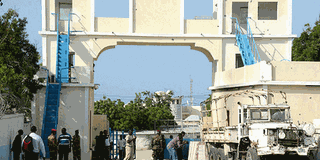Premium
Somalia sacks security chiefs after latest Shabaab attack

Soldiers stand guard as reporters take photos and footage at the main gate of the presidential palace in Mogadishu on July 9, 2014, following an attack by the Islamist Al-Shabaab rebels on July 8, 2014. AFP PHOTO
What you need to know:
- Al-Shabaab commandos stormed the presidential palace late Tuesday for the second time this year, demonstrating again their ability to infiltrate Mogadishu and hit the most fortified centres of the government.
MOGADISHU,
Somalia's president sacked his security chiefs Wednesday after Al-Shabaab fighters struck the heart of government in an escalating campaign of attacks in the capital and across east Africa.
Al-Qaeda-linked Al-Shabaab commandos stormed the presidential palace late Tuesday for the second time this year, demonstrating again their ability to infiltrate Mogadishu and hit the most fortified centres of the country's internationally-backed government.
President Hassan Sheikh Mohamud, who was not in the complex at the time of the attack, delivered a defiant message close to the charred wreckage of the car bomb that gunmen used in their attempt to storm the compound.
"I am here to stay, with Allah's will… I say to them, you will not kill us, and nor will you demolish our spirit," Mohamud said, also thanking the 22,000-strong African Union force that helped battle the attackers and guard top officials.
Despite dismissing the Al-Shabaab attack as a "failure," several top security officials whose job it is to protect the capital were fired.
NEW INTELLIGENCE CHIEF
"Both the police and intelligence chiefs were replaced, and the minister for the national security was named," Information minister Mustafa Duhulow said.
Khalif Ahmed Ereg, a former intelligence chief, was named as Somalia's new national security minister.
The post had been empty since his predecessor resigned in April following a suicide attack against the national parliament while MPs were in a meeting, killing several guards and staff.
Mohamed Abdulahi Hassan was appointed as the new intelligence chief, and Mohamed Sheik Hassan as police chief.
Recent Al-Shabaab attacks have targeted key areas of Somalia's government or the security forces, seemingly as part of a bid to discredit claims the authorities are winning the war against the Islamists.
While the 22,000-strong African Union force launched a fresh offensive in March against Al-Shabaab bases, seizing a series of towns, the insurgents have largely fled in advance and suffered few casualties.
MONETARY AND IDEOLOGICAL SUPPORT
Despite territorial losses, the International Crisis Group warned that the Al-Shabaab fighters continue to have "deep reservoirs of fiscal and ideological suppor," saying in a recent report the "long connection between Al-Shabaab's current leadership and Al-Qaeda is likely to strengthen."
As Al-Shabaab-held towns shrink in number, the extremists are shifting towards using "radicalised and well-trained individuals" to carry out "assassinations and terrorist attacks in urban areas, including increasingly in neighbouring countries, especially Kenya," the ICG said.
An Al-Shabaab spokesman confirmed that the group was behind Tuesday's attack, and claimed their commandos had at one point managed to seize the president's office inside the compound known as Villa Somalia.
However, the government dismissed their claims, saying the attackers — who were dressed in government army uniforms — had been killed near the entrance of the compound.
"Of the four attackers, three were killed in the car park and one was captured," Duhulow said.
Bomb-disposal experts detonated several explosive devices, "including a suicide vest that one attacker was wearing that had failed to detonate," he added.
'FRONTLINE' FOR ASSAULTS
Tuesday's attack appeared to be a repeat of an Al-Shabaab assault against the presidential palace in February, when the Islamists, again wearing Somali army uniforms, managed to penetrate the complex with a car bomb before being killed.
The Al-Shabaab commander in Mogadishu, Sheikh Ali Mohamed Hussein, vowed last month that the capital would become the "frontline" for assaults.
The fighters have also increased their scope of operations since last September, when they launched an attack on Nairobi's Westgate Shopping Mall in which at least 67 people were killed.
In May the Al-Shabaab carried out a restaurant bombing in Djibouti, while Uganda and Ethiopia — countries that also contribute to the AU force in Somalia — have been on high alert.
Kenya has also seen a wave of massacres carried out by Islamists near the coastal resort island of Lamu, for which the Al-Shabaab has claimed responsibility, as well as a string of bombings in Mombasa and Nairobi.





